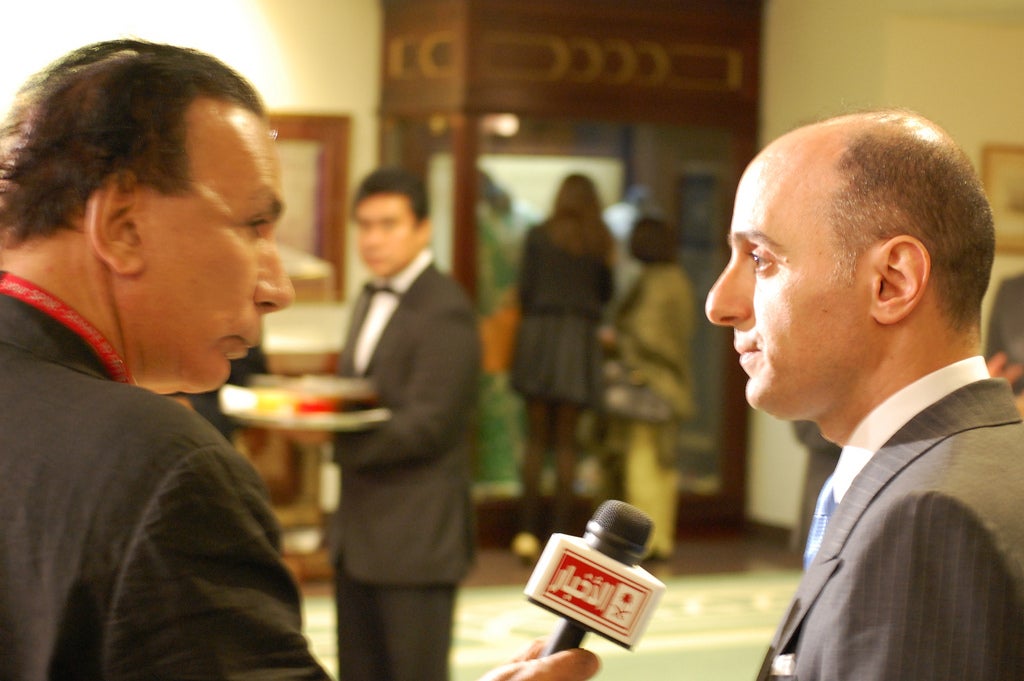WASHINGTON (JTA) — Iran watchers say the revelation of an alleged plot to hire Mexican contract killers to assassinate the Saudi Arabian ambassador to Washington signals the Iranian regime’s deepening radicalization.
It also underscores the urgency of the threat posed by Tehran’s nuclear plans, they say.
“We need to be reminded that if Iran poses a threat without nuclear weapons, a nuclear-armed Iran would be a dramatically more dangerous threat,” Rep. Ted Deutch (D-Fla.), a longtime advocate of Iran sanctions legislation, told JTA.
U.S. Attorney General Eric Holder alleged last week that Iranian-American businessman Mansour Arbabsiar and a cousin who works for the Iranian Revolutionary Guards were caught planning to have a Mexican drug cartel kill Saudi Arabia’s ambassador, Adel al-Jubeir. Demonstrating the seriousness of the plot, the men allegedly arranged for a $100,000 down payment to be deposited into what turned out to be an FBI bank account.
Iranian-backed attacks outside the Middle East once were routine news events. The years that followed the Islamic Revolution of the late 1970s brought a flurry of assassinations of Iranian exiles in foreign capitals, including Washington and Paris. In the 1990s, separate massive bombing attacks on a Jewish community building and the Israeli Embassy in Buenos Aires also have been pinned to Iran.
Iranian-sponsored attacks abroad receded in the later 1990s as the Islamic Republic under then-President Mohammad Khatami sought international legitimacy. At the same time, however, Tehran aggressively stepped up its nuclear program, which is widely believed to be aimed at acquiring nuclear weapons.
The alleged plan to kill the Saudi envoy is a signal that the regime’s conservatives are ascendant, said Roya Hakakian, who recently authored “Assassins of the Turquoise Palace,” an account of Iran’s assassination of Kurdish leaders in Berlin in 1992.
Conservatives consolidated power after the mass protests following elections in the summer of 2009 that were widely perceived as being rigged, she noted.
“The 2009 elections in Iran increasingly solidified the hold of the conservatives on power in Iran,” she said. “They see it less and less necessary to try and do what Khatami was doing in the 1990s, to bring Iran into the fold of Western civilization and community. It’s a sign of further polarization inside Iran between the nation and the regime, but also outside of Iran between Iran and the international community.”
The plot also is a sign of a regime driven increasingly desperate by its mounting isolation, said Heather Hurlburt of the National Security Network, a liberal Washington foreign policy group.
The Obama administration has drawn traditional Iranian partners Russia and China into the sanctions regime, she said, and Iran’s nuclear program apparently has been sabotaged at least once. Moreover, the Iranian regime is attempting to respond to a burgeoning regional pro-democracy wave that it fears could spread to Iran.
“What you’re seeing in these plot allegations and in the region is an Iran that perceives its interests to be at risk because of the Arab Spring,” Hurlburt said. “You see an Iranian government exploring all avenues — they couldn’t come up with a better plot than a crazy guy trying to hire druglords.”
The plot underscores the need for a heightened awareness by the West of a regime that is ready to take extraordinary measures, said Mark Dubowitz, executive director of the conservative Foundation for the Defense of Democracies.
“This regime will continue to target its enemies,” Dubowitz said. “They will not let up until there’s a success.”
Outreach to a drug cartel is typical of a regime that has cultivated rogue actors throughout the Middle East, in Europe and in Latin America, Hakakian said.
The Iranian Revolutionary Guards “has been smart,” she said. “They have been solidifying relations with Venezuelans, with the Cubans, and now they have been moved into Mexican territory.”
Working through interlocutors as unlikely as murderous drug dealers makes sense, Dubowitz said, because the regime has always sought plausible deniability in plotting such attacks.
The immediate response to the plot, said Dubowitz, should be to further isolate the Iranian regime by enforcing existing sanctions and enacting new ones, as well as reinforcing backing for Iran’s democracy movement. He suggested, among other measures, a strike fund to assist Iranian oil workers and others.
Deutch, a member of the U.S. House of Representatives Foreign Affairs Committee, said that the Obama administration should enhance financial sanctions to include Iran’s central bank, which would cut off the country from financial markets, and toughen laws on businesses that deal with Iran.
“We need to shine a light on those companies that violate sanctions laws,” he said.

Help ensure Jewish news remains accessible to all. Your donation to the Jewish Telegraphic Agency powers the trusted journalism that has connected Jewish communities worldwide for more than 100 years. With your help, JTA can continue to deliver vital news and insights. Donate today.






